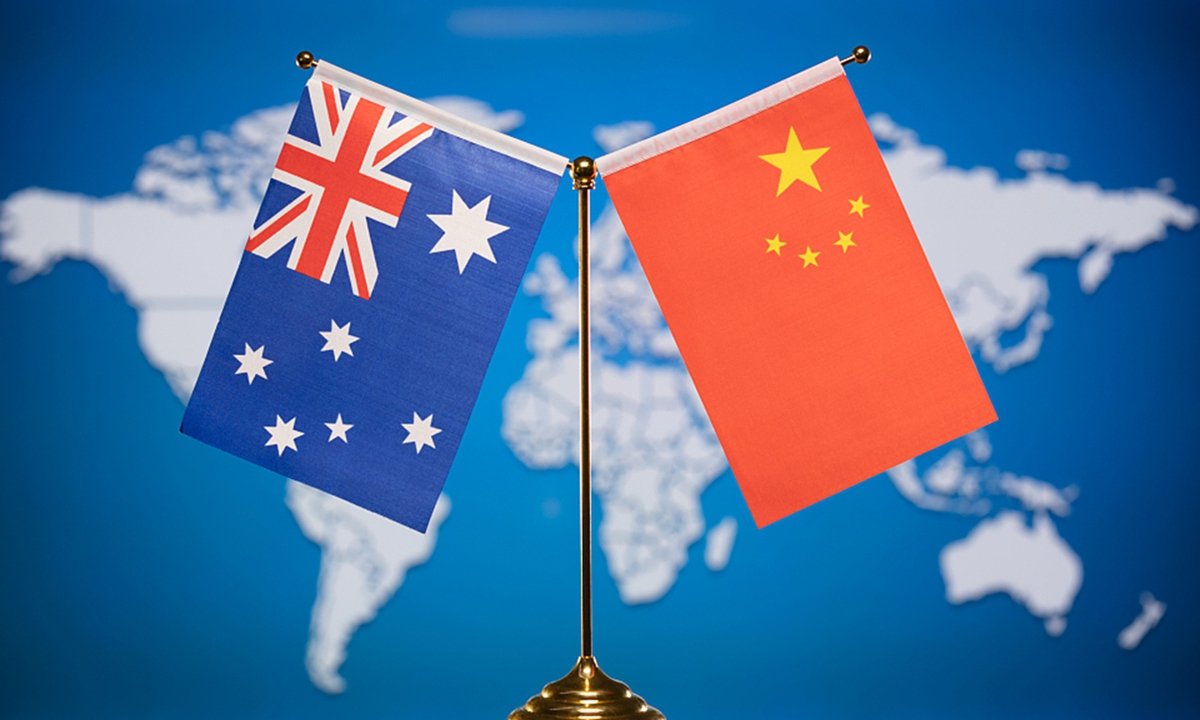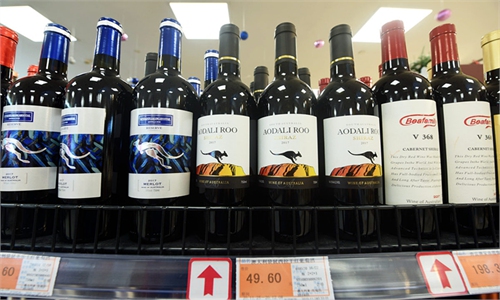Chinese Foreign Minister to visit New Zealand, Australia, kicking off high-level exchanges

China-Australia Photo: VCG
After seven years, Chinese Foreign Minister Wang Yi is scheduled to make another visit to Australia, the Chinese Foreign Ministry confirmed on Thursday, which is widely seen as the latest upswing in China-Australia ties at a time when Beijing is reviewing whether to scrap its wine tariffs.
At the invitation of Deputy Prime Minister and Minister of Foreign Affairs of New Zealand Winston Peters and Minister for Foreign Affairs of Australia Penny Wong, Wang, also member of the Political Bureau of the CPC Central Committee, will pay an official visit to New Zealand and Australia from March 17 to 21.
During his visit to Australia, Wang will hold the seventh China-Australia Foreign and Strategic Dialogue with Penny Wong, which according to expert is a longstanding format for exchanging views on bilateral, regional and international issues of interest.
Wang Wenbin, spokesperson of China's Ministry of Foreign Affairs said on Thursday that China has comprehensive strategic partnerships with both New Zealand and Australia.
This year marks the 10th anniversary of President Xi Jinping's state visit to New Zealand and Australia and also the 10th anniversary of the China-New Zealand and China-Australia comprehensive strategic partnerships. After his previous visit to New Zealand and Australia seven years ago, Foreign Minister Wang Yi's visit this time will kick off this year's high-level exchanges between China and the two countries, said Wang Wenbin.
During the visit, Foreign Minister Wang Yi and the foreign ministers and leaders of the two countries will have extensive and in-depth exchanges of views on bilateral relations and international and regional issues of mutual interest. China looks forward to working with the two countries to deliver on the common understandings between the leaders, enhance strategic communication, deepen mutual trust, advance exchanges and cooperation, promote the steady and sustained growth of the China-New Zealand and China-Australia comprehensive strategic partnerships and contribute to world peace, stability and prosperity, Wang Wenbin noted.
"I think it is a good thing that Wang Yi is visiting," Australian Prime Minister Anthony Albanese told reporters Thursday, citing "significant progress" in removing trade impediments, according to AFP.
Australian media outlet 9News reported that Penny Wong is expected to speak with Wang on March 20 about multiple issues, including remaining trade impediments, consular matters, human rights, conflict prevention and regional security.
"Australia's approach is consistent; we seek to cooperate with China where we can, disagree where we must and engage in our national interest," Wong said in a statement on Wednesday.
"It's Australia's view that a stable bilateral relationship would enable both countries to pursue respective national interests, if we navigate our differences wisely."
Dawn of more high-level exchanges
Since the two heads of state met in Bali in November 2022, the trend for more constructive and mutual beneficial relations has been continually pushed forward under the efforts of both sides.
In December 2022, Penny Wong visited China, the first Australian minister to visit the country since 2019, where she met Wang Yi. Later, in November 2023 Albanese met Xi in Beijing during his trip to China, the first by an Australian prime minister in seven years.
At the same time, in trade and economy exchanges, Australia and China - the former's largest trading partner - are becoming reconciled.
Since China announced in August 2023 plans to end anti-dumping and anti-subsidy duties on barley imported from Australia, many in the country have been expecting the lifting of tariffs on wines.
In response to a media inquiry on whether the Chinese government is to lift tariffs on Australian wine, China's Ministry of Commerce (MOFCOM) said Thursday that the ministry will make a final review ruling in accordance with the investigation procedures based on the comprehensive consideration of the comments of all parties.
During Wang's Australia visit, the topic of trade tariffs is expected to be raised, Chinese analysts believe.
This visit will help bring the trade relationship between the two countries back on track. Also, Australian investment in China is expected to continue to increase steadily with Chinese investment in Australia showing signs of recovery, Yu Lei, professor at Shandong University, told the Global Times on Thursday.
Wang's visit is regarded as safeguarding the hard-won steady and positive development of relations, Chen Hong, director of the Australian Studies Center at East China Normal University, said, adding that after this visit, whether a top-level visit from the Chinese side to Australia can be realized is also worth hoping for, the expert noted, stressing the goal needs joint efforts by the two countries.
Washington's shadow
When Wang Yi last visited Australia in 2017, Malcolm Turnbull of the Liberal Party was in office as the country's 29th prime minister at a time when Donald Trump was starting to roll out a series of anti-China policies from the other side of the Pacific and forcing US allies to follow suit, according to Chen.
Later, when Scott Morrison of the Liberal Party succeeded him in 2018 and showed greater loyalty to Washington by intensifying China-bashing policies, Australia suffered years of frozen ties with China that severely impacted economic, cultural and political exchanges.
Since taking office, Albanese has sought to distance himself from the Morrison administration's anti-China policies, and this upcoming visit by China's foreign minister is seen as a sign that Canberra has walked out of Morrison's shadow, Chen pointed out.
But there is still a question mark hanging over whether Canberra can lift the gloom cast by Washington over ties with Beijing.
In the latest positive sign, Albanese said on Thursday that his government has no plan to copy a move by US legislators to ban TikTok unless it agrees to divest from its Chinese owner, media reported.
But some observers still believe that China and Australia can no longer return to their honeymoon period, since differences on security, military and human rights issues remain.
Yu predicted that Australia's restrictions on Chinese investment in the name of national security will continue, and differences in regional security between the two countries will persist.
Australia's strengthening of its military alliance with the US and its continued challenges to China's sovereignty in the South China Sea will also affect the thawing ties, Yu warned.
Since joining the US-led AUKUS in 2021, Australia has been continuously developing its military strength with its latest announcement on February 20 that it will put an additional 11 billion Australian dollars ($7.25 billion) into defense spending over the next decade, increasing it to 2.4 percent of its GDP, above the two percent target set by its NATO allies.
Observers warned that Canberra appears to be trying to please Washington, increasingly viewing China as a potential threat. But they question whether this is a wise choice for Australia. The biggest beneficiary of Australia's huge defense spending is the US, as they are the world's largest arms dealer and rely on stirring up tensions to sell weapons, observers revealed.
Chen said it is important for Canberra to consider and grasp its real national interests and strike a balance between its alliance with Washington and its partnership with Beijing.
The expert urged Australia to carefully manage differences and refrain from provoking Beijing on sensitive and crucial issues involving China's sovereignty and its territorial integrity.
The two sides should strengthen communication and exchanges, promote regional trade liberalization and investment facilitation, and enhance people-to-people exchanges to solidify the foundation of the bilateral relationship, Yu pointed out.


